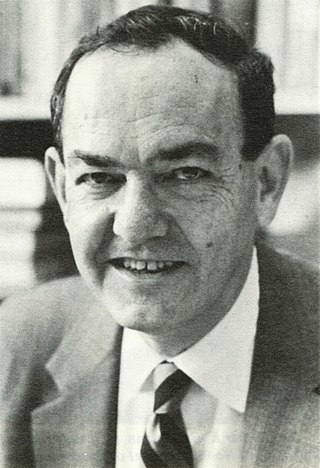Related Research Articles

Herbert Alexander Simon was an American political scientist, with a Ph.D. in political science, whose work also influenced the fields of computer science, economics, and cognitive psychology. His primary research interest was decision-making within organizations and he is best known for the theories of "bounded rationality" and "satisficing". He received the Nobel Memorial Prize in Economic Sciences in 1978 and the Turing Award in computer science in 1975. His research was noted for its interdisciplinary nature and spanned across the fields of cognitive science, computer science, public administration, management, and political science. He was at Carnegie Mellon University for most of his career, from 1949 to 2001, where he helped found the Carnegie Mellon School of Computer Science, one of the first such departments in the world.

Psychology is an academic and applied discipline involving the scientific study of human mental functions and behavior. Occasionally, in addition or opposition to employing the scientific method, it also relies on symbolic interpretation and critical analysis, although these traditions have tended to be less pronounced than in other social sciences, such as sociology. Psychologists study phenomena such as perception, cognition, emotion, personality, behavior, and interpersonal relationships. Some, especially depth psychologists, also study the unconscious mind.
A think-aloudprotocol is a method used to gather data in usability testing in product design and development, in psychology and a range of social sciences.
Introspection is the examination of one's own conscious thoughts and feelings. In psychology, the process of introspection relies on the observation of one's mental state, while in a spiritual context it may refer to the examination of one's soul. Introspection is closely related to human self-reflection and self-discovery and is contrasted with external observation.

Social cognition is a topic within psychology that focuses on how people process, store, and apply information about other people and social situations. It focuses on the role that cognitive processes play in social interactions.

Behaviorism is a systematic approach to understanding the behavior of humans and other animals. It assumes that behavior is either a reflex evoked by the pairing of certain antecedent stimuli in the environment, or a consequence of that individual's history, including especially reinforcement and punishment contingencies, together with the individual's current motivational state and controlling stimuli. Although behaviorists generally accept the important role of heredity in determining behavior, they focus primarily on environmental events.

Integrative complexity is a research psychometric that refers to the degree to which thinking and reasoning involve the recognition and integration of multiple perspectives and possibilities and their interrelated contingencies.
Acceptance and commitment therapy is a form of psychotherapy, as well as a branch of clinical behavior analysis. It is an empirically based psychological intervention that uses acceptance and mindfulness strategies along with commitment and behavior-change strategies to increase psychological flexibility.

Richard Eugene Nisbett is an American social psychologist and writer. He is the Theodore M. Newcomb Distinguished Professor of social psychology and co-director of the Culture and Cognition program at the University of Michigan at Ann Arbor. Nisbett's research interests are in social cognition, culture, social class, and aging. He received his Ph.D. from Columbia University, where his advisor was Stanley Schachter, whose other students at that time included Lee Ross and Judith Rodin.
Semantic satiation is a psychological phenomenon in which repetition causes a word or phrase to temporarily lose meaning for the listener, who then perceives the speech as repeated meaningless sounds. Extended inspection or analysis in place of repetition also produces the same effect.
In psychology, a dual process theory provides an account of how thought can arise in two different ways, or as a result of two different processes. Often, the two processes consist of an implicit (automatic), unconscious process and an explicit (controlled), conscious process. Verbalized explicit processes or attitudes and actions may change with persuasion or education; though implicit process or attitudes usually take a long amount of time to change with the forming of new habits. Dual process theories can be found in social, personality, cognitive, and clinical psychology. It has also been linked with economics via prospect theory and behavioral economics, and increasingly in sociology through cultural analysis.

The following outline is provided as an overview of and topical guide to thought (thinking):
K. Anders Ericsson was a Swedish psychologist and Conradi Eminent Scholar and Professor of Psychology at Florida State University who was internationally recognized as a researcher in the psychological nature of expertise and human performance.
The worked-example effect is a learning effect predicted by cognitive load theory. Specifically, it refers to improved learning observed when worked examples are used as part of instruction, compared to other instructional techniques such as problem-solving and discovery learning. According to Sweller: "The worked example effect is the best known and most widely studied of the cognitive load effects".

In software engineering, rubber duck debugging is a method of debugging code by articulating a problem in spoken or written natural language. The name is a reference to a story in the book The Pragmatic Programmer in which a programmer would carry around a rubber duck and debug their code by forcing themselves to explain it, line-by-line, to the duck. Many other terms exist for this technique, often involving different (usually) inanimate objects, or pets such as a dog or a cat. Teddy bears are also widely used.

Some of the research that is conducted in the field of psychology is more "fundamental" than the research conducted in the applied psychological disciplines, and does not necessarily have a direct application. The subdisciplines within psychology that can be thought to reflect a basic-science orientation include biological psychology, cognitive psychology, neuropsychology, and so on. Research in these subdisciplines is characterized by methodological rigor. The concern of psychology as a basic science is in understanding the laws and processes that underlie behavior, cognition, and emotion. Psychology as a basic science provides a foundation for applied psychology. Applied psychology, by contrast, involves the application of psychological principles and theories yielded up by the basic psychological sciences; these applications are aimed at overcoming problems or promoting well-being in areas such as mental and physical health and education.
Allan M. Collins is an American cognitive scientist, Professor Emeritus of Learning Sciences at Northwestern University's School of Education and Social Policy. His research is recognized as having broad impact on the fields of cognitive psychology, artificial intelligence, and education.
Partial concurrent thinking aloud is a method used to gather data in usability testing with screen reader users. It is a particular kind of think aloud protocol created by Stefano Federici and Simone Borsci at the Interuniversity Center for Research on Cognitive Processing in Natural and Artificial Systems of University of Rome "La Sapienza". The partial concurrent thinking aloud is built up in order to create a specific usability assessment technique for blind users, eligible to maintain the advantages of concurrent and retrospective thinking aloud while overcoming their limits. Using PCTA blind users' verbalizations of problems could be more pertinent and comparable to those given by sighted people who use a concurrent protocol. In the usability evaluation with blind people, the retrospective thinking aloud is often adopted as a functional solution to overcome the structural interference due to thinking aloud and hearing the screen reader imposed by the classic thinking aloud technique; such a solution has yet a relapse in the evaluation method, because the concurrent and the retrospective protocols measure usability from different points of view, one mediated by navigation experience (retrospective) one more direct and pertinent (concurrent). The use of PCTA could be widened to both summative and formative usability evaluations with mixed panels of users, thus extending the number of problems' verbalizations according to disabled users' divergent navigation processes and problem solving strategies.

Psychology encompasses a vast domain, and includes many different approaches to the study of mental processes and behavior. Below are the major areas of inquiry that taken together constitute psychology. A comprehensive list of the sub-fields and areas within psychology can be found at the list of psychology topics and list of psychology disciplines.
Metacognitive therapy (MCT) is a psychotherapy focused on modifying metacognitive beliefs that perpetuate states of worry, rumination and attention fixation. It was created by Adrian Wells based on an information processing model by Wells and Gerald Matthews. It is supported by scientific evidence from a large number of studies.
References
- Austin, J., & Delaney, P. F. (1998). Protocol analysis as a tool for behavior analysis. Analysis of Verbal Behavior, 15, 41–56.
- Crutcher, R. J. (1994). Telling what we know: The use of verbal report methodologies in psychological research. Psychological Science, 5, 241–244.
- Ericsson, K. A., & Crutcher, R. J. (1991). Introspection and verbal reports on cognitive processes - two approaches to the study of thought processes: A response to Howe. New Ideas in Psychology, 9, 57–71.
- Ericsson, K. A., & Simon, H. A. (1993). Protocol analysis: Verbal reports as data. MIT Press, Cambridge, MA.
- Gero, J. S. & McNeill, T (1998) An approach to the analysis of design protocols, Design Studies 19(1): 21-61.
- Pressley, M., & Afflerbach, P. (1995). Verbal protocols of reading: The nature of constructively responsive reading. Hillsdale, NJ, USA: Erlbaum.
- Renkl, A. (1997). Learning from worked-out examples: A study on individual differences. Cognitive Science, 21, 1–29.
- Sudman, S., Bradburn, N. M., & Schwarz, N. (Eds.)(1996). Thinking about answers: The application of cognitive processes to survey methodology. San Francisco, CA, USA: Jossey-Bass.
- Byrd, Nick; Joseph, Brianna; Gongora, Gabriela; Sirota, Miroslav (2023). "Tell Us What You Really Think: A Think Aloud Protocol Analysis of the Verbal Cognitive Reflection Test". Journal of Intelligence. 11 (4). https://doi.org/10.3390/jintelligence11040076.